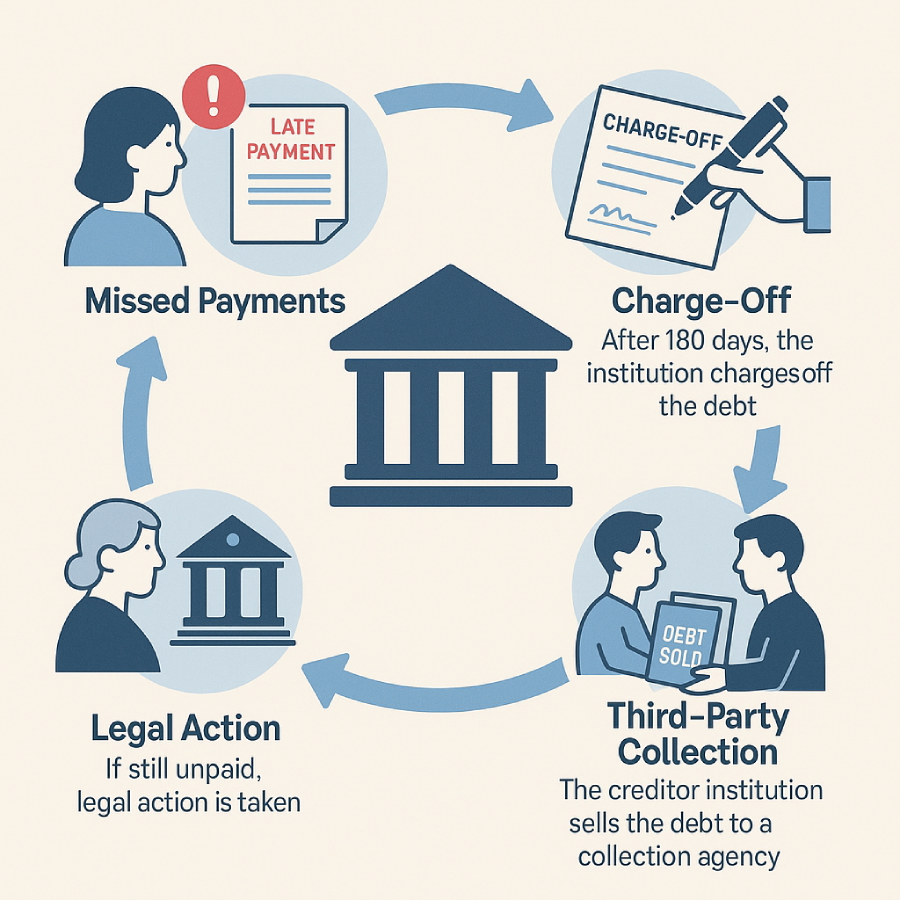Guide to Credit Card Debt in the United States
What Is Credit Card Debt?
Credit card debt is unsecured debt that arises when you use credit cards to borrow money for purchases or cash advances. Unlike secured debt (such as a mortgage or auto loan), credit card debt is not backed by collateral. This means creditors rely on your creditworthiness and your promise to repay.

Why Is Credit Card Debt Often Sent to Collections or Settlement?
- High Prevalence: Credit cards are widely used in the U.S., and many people carry balances from month to month.
- Unsecured Nature: Since there is no collateral, creditors are quick to use collection agencies or negotiate settlements if payments stop.
- Creditor Willingness: Credit card companies are often open to settling for less than the full amount owed, especially after the debt is charged off or sent to collections.

The Collection Process
- Missed Payments: If you miss payments, your account becomes delinquent. The creditor will attempt to collect directly.
- Charge-Off: After about 180 days of non-payment, the creditor may “charge off” the debt, writing it off as a loss.
- Third-Party Collection: The debt is often sold to or assigned to a collection agency, which will attempt to collect the full balance plus fees and interest.
- Legal Action: If you still do not pay, the collector may sue you in court for a judgment, which can lead to wage garnishment or bank account levies, subject to state law limits.
Debt Settlement for Credit Card Debt
- Definition: Debt settlement is when you or a representative negotiates with creditors to accept less than the full amount owed, usually as a lump-sum payment.
- Process: Typically, you stop making payments, save up funds, and then negotiate a settlement. This can be done by yourself, with an attorney, or through a debt settlement company.
- Credit Impact: Debt settlement can significantly harm your credit score. Missed payments, collections, and the "settled" status (rather than "paid in full") will remain on your credit report for up to seven years.
- State Law Differences: Some states, such as Georgia and North Carolina, require an attorney to handle debt settlement legally. Licensing and regulation of debt settlement companies also vary by state.


Consumer Rights and Protections
- Federal Law: The Fair Debt Collection Practices Act (FDCPA) protects you from abusive, deceptive, or unfair collection practices. Collectors cannot harass you, call at unreasonable hours, or misrepresent themselves.
- Right to Validation: You can request written verification of the debt. The collector must provide the creditor’s name, the amount owed, and a notice of your right to dispute the debt within 30 days.
- State Law Protections: Many states require debt collectors to be licensed. If a collector is not licensed in your state, they may not legally collect or sue you there. Some states also provide additional protections regarding wage garnishment and exemptions for essential property.
States Where Debt Collectors Do NOT Need a State License
Some states do not require debt collectors to hold a state license to operate. As of 2024, these states include:
- Georgia
- Kansas
- Kentucky
- Michigan
- Missouri
- Montana
- New Hampshire
- Oklahoma
- Pennsylvania
- South Carolina
- South Dakota
- Tennessee
- Wyoming
Note: Even in these states, certain cities or counties may have their own licensing requirements. Regulations can change, so always check with your state Attorney General or Department of Financial Regulation for the latest rules.
State Licensing Requirements for Debt Collectors
Whether a debt collector must be licensed depends on your state. In most U.S. states, collection agencies must obtain a state license to collect consumer debts legally. If a collector is not licensed where required, they may be breaking the law and typically cannot sue you in that state, which is a strong red flag and could indicate a scam.
Why Licensing Matters
- Unlicensed collectors cannot legally collect or sue for debts in states requiring licensing.
- Licensing helps protect consumers from abusive, fraudulent, or unqualified collection agencies.
- If a collector contacts you, you can ask for their license information and verify it with your state’s regulatory agency.
How to Verify a Debt Collector
- Ask for written validation of the debt.
- You can check the collector’s license status (if required) through your state Attorney General or Department of Financial Regulation.
- Contact your original creditor to confirm the agency is authorized.
- Be alert for red flags such as threats of jail, refusal to provide written details, or requests for payment via gift cards.
Options for Managing Credit Card Debt
- Self-Negotiation: Contact your creditor to request a hardship plan, lower interest rate, or payment arrangement.
- Debt Settlement: Negotiate a lump-sum settlement for less than you owe, either yourself, via an attorney, or through a company. Be aware of state law restrictions.
- Debt Validation/Dispute: If you believe the debt is inaccurate or not yours, you can dispute it and request validation. If the collector cannot prove the debt, it must be removed from your credit report.
- Bankruptcy: As a last resort, Chapter 7 or Chapter 13 bankruptcy can discharge or restructure credit card debt, but has significant long-term credit consequences. Bankruptcy exemptions and procedures vary by state.
- Debt Resolution Programs: Some law firms and agencies offer comprehensive programs that combine dispute, validation, settlement, and credit repair for unsecured debts like credit cards.


Key Takeaways
- Credit card debt is the most likely type of debt to be sent to collections and to be settled for less than the full balance.
- Consumers have strong federal rights under the FDCPA, and many states provide additional protections.
- Always verify the legitimacy of any debt collector and understand your rights before making payments or agreements.
- Laws and protections can vary significantly by state-check your state’s regulations before proceeding with debt settlement or if you are sued.
Recommended Ressources
Explore expert-curated tools and guides to help you better understand and manage your debt. These resources are designed to support you on your journey to financial freedom.


